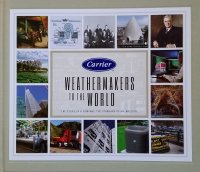 Weathermakers to the World: The Story of a Company. The Standard of an Industry by Eric B. Schultz (Carrier, 2012)
Weathermakers to the World: The Story of a Company. The Standard of an Industry by Eric B. Schultz (Carrier, 2012)
When my daughter's family gave this book to me last Christmas, my son-in-law included this explanation: Because everyone should have a complete Eric Schultz collection. Two years earlier they had given me King Philip's War, Eric's first book. (Which I apparently have not yet reviewed, or that link would be mine, instead of Amazon's.) Do you think I should tell them about his latest, Food Foolish?1
I finished reading Weathermakers to the World last night, just in time to review it for today, the 113th anniversary of Willis Carrier's great invention2 (You can read several excerpts from the book by following that link.) Air conditioning, it turns out, is about a lot more than helping one through a July heat wave—though it does that admirably, for which I'm grateful.
On July 17, 1902, a young research engineer initialed a set of mechanical drawings designed to solve a production problem at the Sackett & Wilhelms Lithography and Printing Company in Brooklyn, New York. ... This new design was different—so novel, in fact, that it would not only help to solve a problem that had long plagued printers, but would one day launch a company and create an entire industry essential to global productivity and personal comfort.
Weathermakers to the World was written for Carrier, the corporation, and doesn't pretend to be unbiased. You won't find here the complaints of disgruntled employees, or any suggestion that Carrier's work is anything other than an unmitigated blessing. What you will find is an advanced coffee table book crafted by a historian with a true love for his subject. Actually, it's not so much a book as a portable museum exhibit. If I occasionally wished for a higher word to picture ratio, well, I do that in museums, too. But I love museums, and am usually as attracted to the design of the exhibit as to its content.
I grew up an air conditioning snob. I lived in the northeast, and there A/C was for wimps. Rich wimps. The two weeks out of the year where it didn't cool down enough to make the day bearable? They build character! My thoughts on that subject are for another post, but I'll just say that what Florida didn't teach me about the value of climate control, Weathermakers to the World did.
Air conditioning wasn't invented to make people comfortable, but to control humidity in a printing plant, thereby greatly increasing quality and productivity. That increase is the real story of Carrier and his invention. (Or rather inventions, plural, because the history of the company is also a history of adaptation and improvement.) I vaguely knew that air conditioning made possible the growth of the American South, but I had no idea what a difference climate control made to the economy everywhere. How it changed everything from movie theaters to chocolate making to deep mining to precision manufacturing. How during World War II large stores such as Macy's and Sears donated their air conditioning systems to companies producing necessary war materials, boosting both the quantity and the quality of their output, quite possibly shortening the length of the war. That "clean" was at first as much a feature of air conditioned systems as "cool": the first train cars to benefit from A/C were dining cars, and passengers were delighted not only by the comfort but that flecks of soot no longer decorated their food. That Carrier's invention revolutionized museums, allowing them to conserve art and artifacts while keeping them accessible to the public. That hospital patients would benefit almost as much from a more comfortable environment as from their treatment.
Even in hospitals, however, the personal benefits of air conditioning were surprisingly slow to come. Three quarters of a century after Willis Carrier initialed those drawings, the hospital where I worked still lacked climate control in many of its wings. The only reason we had the benefit of A/C—and that from inadequate and persnickety units—was that our computers would not work without it. Carrier himself realized the comfort potential early on, but how slow businesses were to realize that people, as well as machines, are more productive under comfortable working conditions! Not that I can fault them: it took me a long time to shed my own A/C snobbery.
Finally, too, I understand why The Occasional CEO (the author's personal blog) occasionally complains about people who think innovation is coming up with a new iPhone app. Willis Carrier was an inventor, an innovator, an entrepreneur who created a product useful in almost every human endeavor, and built a still-successful company and an entire industry around it. Now that's the kind of innovation we need more of. And lest our daughters, in their faithful and sometimes frustrating careers at home, miss the importance of their work in nurturing such innovation, here's what Willis Carrier had to say (thanks, Eric, for including this story):
"One day my mother started to question me regarding fractions, which we were then taking up and working according to rule. She found that my idea of fractions was one number written over another, with a line between. In other words, I had no perception of the concrete significance of the fraction; in fact, I have seen college men who didn't have it either. She then proceeded at once, and with much skill, as I now realize, to demonstrate the principles of fractions with an apple, divided in various ways. As a result, my whole idea of numbers was illuminated and fractions became a very interesting game or puzzle."
This lesson, Carrier would later say, was "the most important thing that ever happened to me." It taught him that solving problems by rules and rote contributed little to genuine understanding. ... In later years, when asked how he had solved problems that had stumped so many others, Dr. Carrier was apt to smile and say, "I just reduce them to a pot of apples."
Reading Weathermakers to the World is like taking a leisurely walk through a museum of technology. My kind of museum, that is: one with an eye-catching design, and more words than push-buttons. If you can't read the book yourself, you can see some good excerpts, as well as a short video, at WillisCarrier.com.
And I note that The Occasional CEO has published a post in honor of this day. I forced myself to write this review before reading it, but you can find some additional interesting links there.
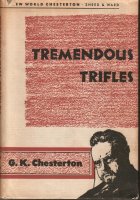 Tremendous Trifles by G. K. Chesterton (Sheed and Ward, 1909)
Tremendous Trifles by G. K. Chesterton (Sheed and Ward, 1909)
This was a Christmas gift back in 2013. (Thanks, DSTB!) Despite my love of Chesterton's writings, it fell into the black hole that is my over-stuffed bookshelf, the bookshelf that takes up most of the back wall of my office, the bookshelf that inspired 95 by 65 goal #63, "Read 26 existing but as yet unread books from my bookshelves." Thanks to that goal, Tremendous Trifles re-emerged.
This series of essays from the very early years of the 20th century were the result of Chesterton's brilliant mind looking in unusual, sometimes bizarre, ways at things and events that most people would ignore—if they noticed them at all. The writings are somewhat dated, but I notice it primarily in missing out on some of the jokes; the ideas are still fresh, fascinating, and yes, sometimes bizarre.
I thoroughly enjoyed reading this real, physical, odor-of-old-libraries book, but if you wish, you can read Tremendous Trifles for free, at Project Gutenberg. (Most of Chesterton's works are now in the public domain.) Here are a few quotations to whet your appetite. (More)
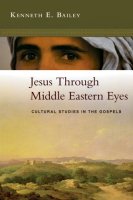 Jesus Through Middle Eastern Eyes: Cultural Studies in the Gospels by Kenneth E. Bailey (IVP Academic, 2008)
Jesus Through Middle Eastern Eyes: Cultural Studies in the Gospels by Kenneth E. Bailey (IVP Academic, 2008)
I cannot remember where I learned about this book—though it seems like the kind of book Peter V. might have recommended—but its description intrigued me enough to put it in my Amazon cart. The order arrived with other, more attractive books, however, so it went on a bookshelf instead of being read immediately. And there it stayed for five years, almost to the day.
This year, however, the title popped up again, on my son-in-law's Amazon wish list. What better way to work on 95 by 65 item #63 (Read 26 existing but as yet unread books from my bookshelves), than to read it myself, bring it to Switzerland with me, and give it to him for his approaching birthday. It was a bit of a challenge to complete the 443 pages in time, even with a transatlantic flight, but I did complete it (though not this review) before making the return trip.
Was it worth the time? Yes, even though most of the reading came at the cost of much-needed sleep, life with three (and then four) grandchildren under the age of five leaving few free moments for sustained attention to anything else. The grandchildren, naturally, were more rewarding, but that's not the book's fault.
Was it all I had hoped for? Not close, I'm afraid. Don't get me wrong: there's a lot of value there. The book starts off with a splash of great promise in the author's argument, based on his knowledge of present and historical Middle Eastern culture, that Jesus was not born in a barn, or even a cave, behind an overflowing inn—despite each location having long tradition behind it—but in a private home, where the traditional guest quarters were already filled. A baby born in the home's main room could have been conveniently laid in the mangers that served the livestock housed in the lower-level end of the room.
The author's cultural knowledge also brings new light to several New Testament stories, such as Zacchaeus' repentance speech:
The moment comes ... when Zacchaeus, who has been reclining with Jesus and the other guests, stands to give his formal response. In traditional Middle Eastern style, he exaggerates in order to demonstrate his sincerity and pledges to give away 50 percent of his assets. Then he says he will pay back fourfold anyone he has cheated. If all the money he has ever collected unjustly from the community over the years amounts to 13 percent of his remaining assets, he cannot fulfill this pledge No one expects him to do so.... In good village fashion...Zacchaeus affirms his sincerity by exaggeration. If he does not exaggerate, the crowd will think he means the opposite.
Math may not be the author's strong point, but you get the idea. And here's the backstory of the miraculous catch of fish in Luke 5:
The Sea of Galilee drops off into deep water close to the shore, and in most areas is too dangerous for swimming. Casting can be done standing in the water or from a boat. Drag fishing, with a long net and two boats, was also practiced.... These two types of fishing can be done during the day. But all fishermen working Gennesaret know that most successful fishing takes place at night and primarily near the shore where fresh water feeds into the lake.... The very idea that a landlubber from the highlands of Nazareth, who has never wet a line, should presume to tell a seasoned fishing captain what to do is preposterous. The fish can see and avoid the nets during the day, but they feed at night. The order to launch into the deeps in broad daylight is ridiculous.
And of Jesus' conversation with the woman at the well in John 4:
He breaks the social taboo against talking to a woman, particularly in an uninhabited place with no witnesses. Throughout forty years of life in the Middle East I have never crossed this social boundary line. In village society, a strange man does not even make eye contact with a woman in a public place.
If the whole book were like this, I'd be sorry I promised to give it away. But despite repeatedly, and correctly, pressing the point that our 21st century viewpoints distort what we see in these 1st century stories, it's clear that the author allows his own opinions to influence his interpretations. He's also so very convinced that his interpretations are the correct ones, and too often speaks this assurance over what clearly are speculations.
While it's good to know how radically Jesus departed from the customs of his time in his interactions with women, I'm not convinced that promoting gender equality was Jesus' primary purpose in these encounters, though that seems to be the author's view.
Bailey's opinions intrude frequently, unnecessarily, and at times offensively.
History is replete with examples of one ethnic community displacing another. To accomplish such a goal the aggressors usually feel the need to demean those they are brutalizing. Words such as savages, vermin, and now terrorists ring down the centuries.
His apparent problem with labelling those who commit organized acts of terror as "terrorists" is gratuitously offensive. The provocation distracts from his point while adding nothing to it. So too with his bias against the modern state of Israel, which crops up now and then.
Although my next complaint is admittedly petty, it's like fingernails on a blackboard to me when Bailey uses outdated slang, such as "head trip," and overused phrases meant to sound Biblical which aren't, like "speaking truth to power."
For all that, Jesus Through Middle Eastern Eyes is worth reading. In addition to giving cultural insights, Bailey unlocks the rhetorical style and structure of many of the Biblical stories. I'm not sure how much this actually adds to understanding, but it's interesting, and not at all obvious to the casual, English-speaking reader.
The ... challenge is to realize the historical nature of the Word of God. The Bible for Christians is not just the Word of God. Rather, it is the Word of God spoken through people in history. Those people and that history cannot be ignored without missing the speaker or writer's intentions and creating our own substitutes for them. Historical interpretation is the key to unlocking the vault that contains the gold of theological meaning.... It is helpful to note that this is true of all significant literature.
There were Sandra Boynton books around when our children were young, but they were new, and we mostly missed them. When our nephews later introduced them to us, I wasn't all that impressed. Very few books directed at children impress me. But in the last month I have become a fan.
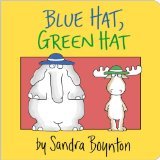
Specifically, of Blue Hat, Green Hat and But Not the Hippopotamus. Daniel (22 months) wants them read over and over and over and over and over ... but I've yet to grow weary of them. It helps that they're short, but it's mostly his enthusiasm that keeps me going. He can very nearly read them to himself, thanks to the repetition within the books as well as the repeated readings. He gleefully fills in "Oops!" and "Hippopotamus" in the appropriate places, and tonight, after I refused to read any more, I heard him "reading" several pages of the latter book to himself. "Should stay? Should go?" and with the greatest expression. Such fun.
So, a very belated thank you, Ms. Boynton!
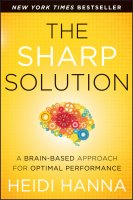 The SHARP Solution: A Brain-Based Approach for Optimal Performance by Heidi Hanna (Wiley, 2013)
The SHARP Solution: A Brain-Based Approach for Optimal Performance by Heidi Hanna (Wiley, 2013)
My brother knows my predilection for brain training, health, organizational, and similar self-improvement books; therefore he kindly lent me The SHARP Solution. If I'm not as enthusiastic as I (and perhaps he) had hoped, it may be because I've read so many such books already. As I found with Gretchen Rubin's Better than Before, prior familiarity with the material breeds contempt for foibles I'm otherwise inclined to overlook.
What are the annoying foibles in The SHARP Solution? Number one for me is that the book tries to be scientific but keeps slipping into touchy-feely. For example, the author repeatedly contrasts the brain and the heart, but while the brain is treated as a physical organ, its interconnected neurons subject to chemical influences and evolutionary biology, the heart is viewed as metaphorical, not the living, beating blood pump in our chests. Second on the fingernails-on-the-blackboard list is the harping on meditation as a magic bullet for whatever ails us. And while I do acknowledge the important of social interactions and support, Hanna clearly writes from an extrovert's perspective, which makes that section of the book less helpful to me.
That said, there are some good points, and I do have an assortment of quotations this time:
One of the key insights to come recently from cognitive science tells us that when we multitask, we tend to drop out of high-level rational decision-making, and slip into monkey-brain reactions in our various split activities. [The oft-repeated term "monkey brain" is also high on my list of annoyances.] Because we have so many things going on, we operate mostly on automatic pilot, rather than reflecting on our decisions and actions. Multitasking often prompts us to make mindless decisions that may end up causing serious problems with important responsibilities or relationships.
Remember: Your brain wants to conserve energy for possible threats during the day. Therefore, it prefers to use automatic pilot mode as often as possible. Habits save us a great amount of mental energy. ... [Habits] enable us to get much more done during the day than would be possible if we had to concentrate our full conscious attention on tasks like tying our shoes and brushing our teeth. Habits are patterns of thought and behavior that we've performed so often and so successfully that they become programmed into our auto-minds and no longer require our full attention.
Of course, it may be unavoidable to encounter certain situations that require multitasking. ... A parent with more than one child certainly knows how important it is to be able to split focus.... [I would add that even one child can put a parent in that position.] We're often able to tone our multitasking muscles through practice, stress management, and a good self-care regimen.... "It doesn't mean you can't do several things at the same time," says Dr. Marcel Just, co-director of Carnegie Mellon University's Center for Cognitive Brain Imaging. "But we're kidding ourselves if we think we can do so without cost." Your attention comes at a cost: your energy.
Whereas adrenaline prepares you for fight or flight, cortisol prepares you to hunker down and protect yourself Instead of needing a quick spurt of energy, cortisol works to increase glucose in the bloodstream and store it away for future needs. This is one of the reasons why stress has been linked to excess fat storage: It not only stimulates a desire for comfort and distraction, but also pushes the brain into energy-storage mode.
If we are to train our brains to be more versatile, flexible, and resilient, we must ultimately be able to shift out of thinking and problem-solving mode and into reflective, insight mode. Of course, this requires that we set aside time and mental space to practice our ability to do nothing at all.
I occasionally become too focused on my work, and so I look forward to massage in order to help me with my writing. I often feel my stress levels growing when I strive to be creative, since I become increasingly stumped for new ideas. However, when I concentrate on quieting my mind and relaxing my body, without judging myself or my thoughts, that's when I discover new solutions, fresh ideas, and a boost in my creativity. I believe in this concept so much I even made it company policy that all members of our team get monthly massage (or other spa service) every month—my treat! [Her typo, not mine.]
I always warn against preaching about healthy living. Even though they are passionate about improving their loved ones' health and longevity, having someone lecture you about all the things you already know you should be doing but haven't been able to do in the past is not helpful. In fact, the only thing it definitely will do is make them more stressed, and no doubt increase your stress levels at the same time.
One of the difficulties with changing behavior is that it often takes a lot of energy just to get started. ... One important strategy that will help make healthy choices a regular part of your life is to decrease what's called activation energy. In physics, activation energy is the stimulus required to cause some sort of reaction; in human behavior, it's the energy we must expend in order to do something new. In his book, The Happiness Advantage, Shawn Achor talks about his experience with activation energy when he was trying to practice guitar more frequently. In his description of what he calls the 20-Second Rule, Achor put the guitar closer to the couch and moved the television remote further away—about 20 seconds away, to be exact. "What I had done here, essentially, was put the desired behavior on the path of least resistance, so it actually took less energy for me to pick up and practice the guitar than to avoid it." He calls it the 20-Second Rule, "because lowering the barrier to change by just 20 seconds was all it took to help me form a new life habit."
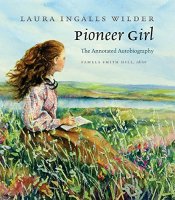 Pioneer Girl: The Annotated Autobiography by Laura Ingalls Wilder, edited by Pamela Smith Hill (South Dakota Historical Society Press, 2014)
Pioneer Girl: The Annotated Autobiography by Laura Ingalls Wilder, edited by Pamela Smith Hill (South Dakota Historical Society Press, 2014)
As a young child I fell in love with Laura Ingalls Wilder's Little House in the Big Woods, and naturally ate up the rest of the series when I discovered it. The earlier books (particularly Little House in the Big Woods and Farmer Boy) remain my favorites, and having now read Pioneer Girl I better know why. The first few books in the series are full of the delight of a child and a child's-eye view that paints pioneer days with glory: the joy of good work, good food, open spaces, hope, family togetherness, and lots of "Inch by Inch" hippie naiveté. As the story goes on, however, the children grow older, and adult worries and realities intrude. Plus, I've never gotten over my childhood dislike of of romance stories, and if anything, coming-of-age stories are even worse. I identify a lot with Peter Pan.
Pioneer Girl was Wilder's original, unpublished memoir, from which grew the Little House series, as well as many of daughter Rose Wilder Lane's writings. It is full of the adult realities behind all the books. As such, it is informative, even fascinating—but also a sharp reminder that it takes more than a rake, a hoe, and a piece of fertile ground to make a garden, or a life. Don't get me wrong; this is no exposé, revealing the deep, dark secrets behind the children's books. It's just that it made me realize that I'd rather keep my genealogy real and my children's stories warm-and-fuzzy.
There is a lot of genealogy in Pioneer Girl, as Hill has painstakingly identified the people that Wilder wrote of, even in passing. Reading it reminds me of my work for Phoebe's Quilt, only a lot more extensive. "Extensive" is the word for Hill's annotations. Genealogy, comparing versions of the materials, analyzing writing style, researching historical realities, and explaining cultural references in minute detail; whatever it is, Hill's work is extensive. Some of that I appreciated, and some I did not. Although the book is clearly written for adults, Hill seems to assume that her readers are no more knowledgeable than the children who were the intended audience for the Little House series. She explains common cultural knowledge in excruciating detail; had she been analyzing my first paragraph above, she would have provided publisher information for the books, provided the lyrics for the song, explained about hippies, defined the romance and coming-of-age genres, and told the story of Peter Pan, including its author, date of publication, and cultural significance. I have to admit I prefer not to be considered completely ignorant, even if it means I have to look some things up.
Serious Little House devotees will find it worthwhile to read Pioneer Girl. I found it encouraging to learn that while the books are deliberately fiction, and have taken liberties with some of the facts, most notably by leaving out significant events and rearranging the order of others, Little House is no mere "inspired by" work that bears little to no resemblance to the facts. The stories ring true because they mostly are true. But people's lives simply don't unfold the way a good story does, and Laura Ingalls Wilder chose to craft her tales of American pioneer life with all the skill of a novelist.
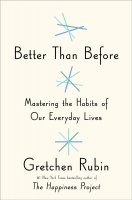 Better than Before: Mastering the Habits of Our Everyday Lives by Gretchen Rubin (Crown Publishers, 2015)
Better than Before: Mastering the Habits of Our Everyday Lives by Gretchen Rubin (Crown Publishers, 2015)
This book started slowly for me, though not for bad reasons: I spent too much time (and not enough) trying to answer some of the self-examination questions Rubin asks at the beginning. It might be useful to revisit them when I'm feeling less time pressure (as if that day will ever come!). I was somewhat frustrated because she keeps dividing the world into categories—Are you an Upholder, a Questioner, an Obliger, or a Rebel? A Marathoner, Sprinter, or Procrastinator? A Finisher or an Opener?—and all too often I find myself a true mélange, which leaves me unable to get as much from her later prescriptions as I otherwise might. I bogged down again over her preoccupation with diet, and her low-carb proselytizing. Finally, however, I realized that my less-than-enthusiastic reaction was primarily due to the fact that not a lot of what Rubin says was new to me. Her Happiness Project books (my reviews are here and here) have many of the same characteristics I dislike, but they were so full of new and fascinating material that it didn't matter. This time it did—or perhaps I just shouldn't have been in such a hurry to read it. This was one of my "How Not to Read a Book" books, and I didn't have the time to festoon it with my usual sticky notes. Hence, you get no quotations.
Be that as it may, there's still much of value, and I may re-read Better than Before at a later date. For now I'll just mention the idea that struck me the most, and which I've already started to implement in daily life: One of the greatest advantages to establishing habits is that it frees us from much decision making. I'm one of those who feels as if I have only so much decision-making power each day, and anything that conserves that supply for more important decisions must be a useful tool.
Rubin's ideas about the usefulness of scheduling, accountability, monitoring, first steps, convenience/inconvenience, habit pairing, and the do's and don'ts of distraction and rewards are not new, but it's helpful to have them together in one book. Better than Before is a good accessory to the Tiny Habits approach.
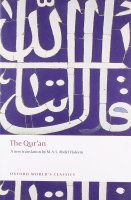 The Qur'an, English translation by M. A. S. Abdel Haleem (Oxford University Press, 2004)
The Qur'an, English translation by M. A. S. Abdel Haleem (Oxford University Press, 2004)
In the most important sense, a holy book cannot be subject to review. It matters little whether or not I consider it holy; the fact that others do puts it in a different category of book. For one thing, one must take greater care than normal to be respectful; that is merely good manners. It also means that as a non-Muslim, I cannot adequately judge the Qur'an on the basis for which it was intended, that is, as spiritual guidance and inspiration for Muslims. And yet, just as there is value in reading the Bible as literature, I believe the Qur'an may profitably be read in the same way. Not to mention that it might be valuable to have at least some familiarity with a book that is so important to the two and a half billion or so Muslims around the world.
There is also the problem of reading a translation. To Muslims, as I understand it, the Qur'an is a holy book in a much more literal sense than the Bible is to Christians. That is, the book itself is holy, not just its contents. What's more, it is the Qur'an in Arabic that really matters, in contrast to the Christian idea that the Bible speaks best to everyone in his native tongue. While it is certainly instructive—essential for seminary students and scholars—to read the Bible in Hebrew and Greek, that is not considered a necessary skill for most Christians. For Muslims, however, you're not really reading or reciting the Qur'an unless it is in Arabic. I'm of two minds about this. On the one hand, it's a great unifying factor, as when Latin was essential in the Catholic church, when priests all over the world could understand each other, and the Mass was basically the same wherever you went. But there's no doubt that true understanding is difficult (impossible?) in a foreign tongue.
The Qur'an itself makes the point repeatedly that it is an Arabic revelation—though I can't resist mentioning that the point being made at the time was that it was in a language the ordinary people understood.
I don't have anything to compare it with, but I will nonetheless give high marks to this particular translation. It is not beautiful English, but it is easy to understand, and the translator has provided just the right amount of commentary, that is, enough to provide historical context and explain certain idioms and literary conventions, while not interrupting unduly the flow of the writing.
Despite all the above caveats, I'll share some of my observations, based on a single read-through: (More)
I appreciate that I can place books on hold at our library, knowing that they will be set aside for me as soon as they become available. But I do wonder about the timing sometimes. A while back, I had placed holds on Gretchen Rubin's Better than Before, and on Pioneer Girl, the annotated autobiography of Laura Ingalls Wilder. Several people were ahead of me on the waiting list for each of them, so I was not expecting to read them anytime soon, though with one I was much closer to the top than the other. Wouldn't you know, both books suddenly became available at the same time—right before we left for several days out of town. I had to check them out, or lose my place in line, even though neither was suitable for taking with me on the trip.
We returned a week before the books were due. The normal lending period is three weeks, but for popular books it is reduced to two—with no possibility of renewal. Thanks to some other tasks taking top priority after our return, it wasn't until the weekend that I got very far into Better than Before. And Pioneer Girl? It has 400 pages. Wilder's actual text is in larger print, but the bulk of the book is Pamela Smith Hill's copious, detailed—yea, exhaustive—small-print footnotes. I read it in under 24 hours.
That's not how to read a book. It's like trying to quench your thirst while standing under a waterfall: you get exhausted trying to keep your balance, and end up more drowned than hydrated.
Nonetheless, I did get quite a bit from both books, enough for each to merit its own, upcoming, review. At first I was just going to include very brief comments on them in this post, but "very brief" and I don't keep company much. There's a reason my Tweets are mostly hyperlinks back here.
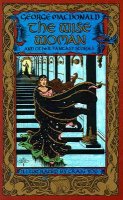 The Wise Woman: A Parable (also known as The Lost Princess, and as A Double Story) by George MacDonald (1875)
The Wise Woman: A Parable (also known as The Lost Princess, and as A Double Story) by George MacDonald (1875)
My project to read all of George MacDonald's books in chronological order (95 by 65 item #61) led me recently to The Wise Woman, and I can well see why C.S. Lewis classed it as one of MacDonald's very best stories, along with Phantastes, the Curdie books, The Golden Key, and Lilith. It's a delight through and through, and more than most fits my prime criterion for a good book: A good book inspires me to be a better person. I realize that distinction doesn't sound very impressive. I don't mean a moralistic book, or a book that tells me to be better; rather, one written in such a way as to provoke, deep within, both the desire to improve and the hope that improvement is not impossible.
The Wise Woman well deserves what Lewis said about the mythopoeic genre—at which MacDonald excelled:
[I]t produces works which give us (at the first meeting) as much delight and (on prolonged acquaintance) as much wisdom and strength as the works of the greatest poets. It is in some ways more akin to music than to poetry—or at least to most poetry. It goes beyond the expression of things we have already felt. It arouses in us sensations we have never had before, never anticipated having, as though we had broken out of our normal mode of consciousness and "possessed joys not promised to our birth." It gets under our skin, hits us at a level deeper; than our thoughts or even our passions, troubles oldest certainties till all questions are reopened, and in general shocks us more fully awake than we are for most of our lives.
Have I made it sound too intimidating? Never mind, then. It's short (116 pages), it's free on Kindle (under the title, A Double Story), and entirely grandchild-safe.
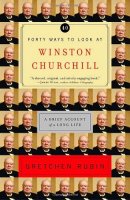 Forty Ways to Look at Winston Churchill by Gretchen Rubin (Ballentine Books, 2003)
Forty Ways to Look at Winston Churchill by Gretchen Rubin (Ballentine Books, 2003)
What can Gretchen Rubin, famous for her books on happiness (The Happiness Project, Happier at Home), add to the multitude of books written about Churchill? Plenty, it turns out—at least if you are as ignorant of history as I am. Porter found it less interesting, because for him, there was little new.
My own interest in this book was piqued for a couple of reasons. While I was checking our library for Rubin's latest book, Better than Before, this—written well before her happiness books—popped up. Because we had recently watched the excellent Great Courses series on Churchill, I snapped it up.
My knowledge of Churchill being essentially no more than I had learned through those lectures, it was good, not tiresome, to hear the same stories again. Plus, the strength of Rubin's book is not in depth or special insight, but because she pulls together views of the man from many different biographical sources, demonstrating in the process just how difficult it is to write a biography—and impossible to write an unbiased one. In fact, the only real weakness I see in Rubin's book is that she can't hide her own great admiration for the man: she can't write the opposing side convincingly. But the facts are there, positive and negative, and I highly recommend Forty Ways as an easy-to-read introduction to this brilliant, complex man and his indomitable spirit.
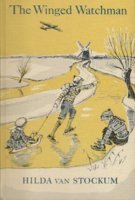 The Winged Watchman by Hilda van Stockum (1962)
The Winged Watchman by Hilda van Stockum (1962)
When I was a child our family hardly ever bought books. We were great readers—we didn't own a television set until I was seven years old—but books were too expensive to buy when the public library was free. If our tiny village library in Scotia, New York did not have what we needed, an expedition to the Schenectady city library was usually sufficient. (There was no Inter Library Loan at the time.) Imagine the glory when we moved to the Philadelphia area and I discovered that their incredible Free Library was only a train ride away.
Printed books were also (relatively) more expensive then, as this was before the explosion of available paperback books and well before the view of books as disposable items. Nonetheless, one of the great things my parents did for me was to sign me up for the Weekly Reader Children's Book Club, which periodically delivered a brand-new hardcover children's book to our door. I still have many of the books, and am surprised at the consistent, excellent quality (considering how many bad children's books are now available), even looking back from the perspective of over half a century.
One of those books was The Winged Watchman, a story of Holland during World War II. I had passed my copy on to our grandchildren, but it was recently returned because they had acquired another copy through their homeschooling curriculum. Naturally, I couldn't resist re-reading one of my childhood favorites.
The Winged Watchman is still a favorite. It's a glimpse of another culture in very difficult time, historically accurate without being depressing or overly graphic, and fits well my definition of a good book. (A good book inspires me to be a better person.)
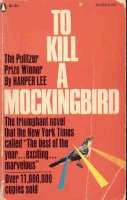 To Kill a Mockingbird by Harper Lee (1960)
To Kill a Mockingbird by Harper Lee (1960)
I don't remember when I first read To Kill a Mockingbird. Or even if I read it at all. Did I read it in school, and was it therefore in my mind consigned to the Pit as worthless? (I am an avid reader and re-reader, but no thanks to school, which utterly failed to reveal to me the good qualities of any book we were forced to read.) Did I read it after meeting Porter and learning that this is his all-time favorite book? Or did I only watch the movie? If I did read it, I know I was not impressed, because books that I find worthwhile I will read over and over again, soaking them into my very being—and I know I didn't read To Kill a Mockingbird twice.
I'm really curious: Did I make my judgement on the movie alone? Movies rarely impress me the way books can. Or was I just not psychologically ready to appreciate Harper Lee's masterpiece? The latter is possible. If I read it under Porter's influence, I would still have been very close to my school years and thus predisposed to being negative about "important" literature. More to the point, I was at that time in my life extremely prejudiced against the South, and would have had little appreciation and less sympathy for the tribulations of small-own Alabama and its people. I also had much less appreciation for good writing then than I do now.
Whatever the case, I was inspired by two recent events to give To Kill a Mockingbird another try. First, we attended a local theater presentation of the story, which was excellently done and served to reveal that I'd clearly gotten nothing out of my first experience, be it book or movie. Second, Heather was given some lavender bath salts that she had passed on to me, and I wanted to try them out. I love to read in the bath, but my current reading was on my Kindle, and the combination of electronics and bath water sounds like a disaster waiting to happen. So I pulled To Kill a Mockingbird off the bookshelf and dove into new waters—both physical and metaphorical.
It took me nearly half a century to discover it, but Porter was absolutely right: this is an astonishingly wonderful book. I knew in the first two pages that if I had ever read it before, I certainly hadn't read it. What wonderful writing! What a beautiful and important story! If I had to boil my definition of a good book down to one sentence, it would be this: A good book inspires me to be a better person. The character of Atticus Finch alone can provide a lifetime of inspiration.
C. S. Lewis once wrote that it is easy for an author to create evil characters, because he need look no further than his own heart for inspiration, but to be able to create a credible portrait of good is a rare gift. Lewis was, in that instance, praising the Scottish author George MacDonald, but I'm certain he would have said the same about Harper Lee. Atticus Finch is as inspiring a noble character as could be wished. At the same time, there is not a whit of sentimentality anywhere in the book. There is real life, hard times, hard-core racism, poverty, incest, drug addiction, mental illness ... heroism, understanding, self-sacrifice, duty, love ... above all there is grace ... all in a package that I would not hesitate to recommend to our 11-year-old grandson.
The movie version with Gregory Peck is well-known, but I wouldn't go there. Nothing less than the book could possibly do justice to the story.
For certain if I read To Kill a Mockingbird in the past it was well before homeschooling was ever on my radar. Else how could I possibly have forgotten these passages? Minor though they certainly are in the course of the story, they are nonetheless brilliant. (More)
Gifted Hands: The Ben Carson Story. This movie needs no more review than this: See it.
But of course I can't leave it at that. There are so many films, shows, books, and even Great Courses lectures I'd love for my grandchildren, especially the older ones, to experience, but there's always something that turns a great story into something NSFG. We used to be able to portray the rawer side of life in a way that left something to the imagination, but that sensitivity is now out of style. Gifted Hands, despite being non-rated, is a happy exception. There are some difficult situations and heartbreak, but nothing to detract from the story.
Ben Carson from inner-city Detroit, raised by a single mom (but what a mother!), failing in school, headed for trouble. Dr. Ben Carson, world-famous director of neurosurgery at Johns Hopkins. Gifted Hands tells the tale—fictionalized and condensed, but remarkably accurate for all that—of the transformation. The movie is enjoyable on many levels, from watching Ben's mother inspire her children to learn, to getting a glimpse of the Biltmore House library (professor's house in the movie), to realizing that it's possible to be both a top-notch neurosurgeon and a humble and good-natured person.
Great story. No caveats. Much inspiration. Enjoy!
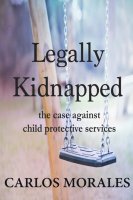 Legally Kidnapped: The Case Against Child Protective Services by Carlos Morales (Amazon Digital Services, 2014)
Legally Kidnapped: The Case Against Child Protective Services by Carlos Morales (Amazon Digital Services, 2014)
Legally Kidnapped is probably good for any parent to read who either (1) has childrearing philosophies and/or practices that differ at all from the current norm, or (2) thinks they might at some point tick off a family member, friend, or neighbor. There are frightening abuses taking place under the authority of Child Protective Services (name varies by state), where vulnerable children are ripped away from their families for days, months, or years, and for no reason other than ignorance and reasonable philosophical differences. The author says, and I believe him, that "children are much more likely to be kidnapped by State workers than by strangers."
It happened here just a few months ago, basically because the mother was a vegan. A doctor friend in New York told me (without names, of course) of testifying in favor of a family whose children had been taken from them: the excuse was an infected cut, but he said the real reason was the animosity of the social worker to the family's religion. And it's not just in the United States: Germany and Sweden have separated children from their families simply because they were being educated at home. It is a problem, and Carlos Morales, a former CPS agent who knows the system from the inside, offers some helpful information to educate, inform, and assist parents who might find themselves at risk. Some of the most important: record (preferably video) all encounters and interviews, never let your children be interviewed alone, always be calm and polite.
That's the good news. Sadly, I can't really recommend the book. The author, perhaps driven by guilt because of his former complicity, is too strident and extreme. He could have used some of his own advice about being calm and polite. Also, the book is replete with basic punctuation and typographical errors, which rightly or not steal credibility from its message.
Still, if anyone wants to glean what is good, it's short (95 pages), the price is reasonable ($2.99 Kindle price on Amazon, and I got it free when they were running a special), and Amazon tells me that I can lend my Kindle copy out one time for 14 days at no charge.


